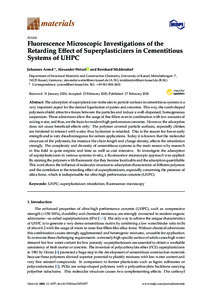Fluorescence Microscopic Investigations of the Retarding Effect of Superplasticizers in Cementitious Systems of UHPC
| dc.date.accessioned | 2021-08-04T11:07:52Z | |
| dc.date.available | 2021-08-04T11:07:52Z | |
| dc.date.issued | 2020-02-27 | |
| dc.identifier | doi:10.17170/kobra-202108044482 | |
| dc.identifier.uri | http://hdl.handle.net/123456789/13073 | |
| dc.language.iso | eng | eng |
| dc.rights | Namensnennung 4.0 International | * |
| dc.rights.uri | http://creativecommons.org/licenses/by/4.0/ | * |
| dc.subject | UHPC | eng |
| dc.subject | superplasticizer | eng |
| dc.subject | retardation | eng |
| dc.subject | fluorescence microscopy | eng |
| dc.subject.ddc | 660 | |
| dc.title | Fluorescence Microscopic Investigations of the Retarding Effect of Superplasticizers in Cementitious Systems of UHPC | eng |
| dc.type | Aufsatz | |
| dcterms.abstract | The adsorption of superplasticizer molecules to particle surfaces in cementitious systems is a very important aspect for the desired liquefaction of pastes and concretes. This way, the comb shaped polymers shield attractive forces between the particles and induce a well-dispersed, homogeneous suspension. These admixtures allow the usage of fine fillers even in combination with low amounts of mixing water, and thus, are the basis for modern high performance concretes. However, the adsorption does not cause beneficial effects only: The polymer covered particle surfaces, especially clinker, are hindered to interact with water, thus hydration is retarded. This is the reason for lower early strength and is very disadvantageous for certain applications. Today it is known that the molecular structure of the polymers, for instance the chain length and charge density, affects the retardation strongly. The complexity and diversity of cementitious systems is the main reason why research in this field is quite empiric and time as well as cost intensive. To investigate the adsorption of superplasticizers in various systems in-situ, a fluorescence microscopic approach was applied: By staining the polymers with fluorescent dye they become localizable and the adsorption quantifiable. This work shows the influence of molecular structure to adsorption characteristic of different polymers and the correlation to the retarding effect of superplasticizers, especially concerning the presence of silica fume, which is indispensable for ultra-high performance concrete (UHPC). | eng |
| dcterms.accessRights | open access | |
| dcterms.creator | Arend, Johannes | |
| dcterms.creator | Wetzel, Alexander | |
| dcterms.creator | Middendorf, Bernhard | |
| dc.relation.doi | doi:10.3390/ma13051057 | |
| dc.subject.swd | Ultrahochfester Beton | ger |
| dc.subject.swd | Betonverflüssiger | ger |
| dc.subject.swd | Adsorption | ger |
| dc.subject.swd | Verzögerung | ger |
| dc.subject.swd | Fluoreszenzmikroskopie | ger |
| dc.type.version | publishedVersion | |
| dcterms.source.identifier | eissn:1996-1944 | |
| dcterms.source.issue | Issue 5 | |
| dcterms.source.journal | Materials | eng |
| dcterms.source.volume | Volume 13 | |
| kup.iskup | false | |
| dcterms.source.articlenumber | 1057 |
Files in this item
This item appears in the following Collection(s)
-
Publikationen [1]


